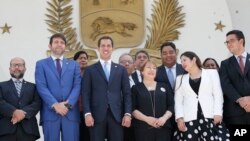Venezuelan opposition leader Juan Guaido said Friday he expressed in a meeting with United Nations High Commissioner for Human Rights Michelle Bachelet the need to oust President Nicolas Maduro and end the country's "suffering."
Bachelet met with Guaido in Caracas on the last day of her visit to Venezuela and was scheduled to meet separately with Maduro before she leaves the country.
Guaido told reporters after the meeting Bachelet's visit would "serve to bring solutions to the catastrophe that this country is experiencing and "serve to reinvigorate the fight in Venezuela."
Guaido also said two members of Bachelet's team would remain in the country to investigate issues related to shortages of essential goods and allegations Maduro has violated human rights while cracking down on the opposition.
Bachelet's trip comes as both men continue to struggle for control of the crisis-ridden, oil-rich country.
Guaido's five-month campaign to oust Maduro has not been successful, despite being recognized as Venezuela's legitimate president by U.S. President Donald Trump and about other 50 other world leaders.
Maduro has maintained that Guaido's efforts have been part of a U.S.-backed coup attempt. Appearing on state television before Bachelet's Wednesday arrival, Maduro said he was ready to hear her proposals to improve conditions in Venezuela and said her visit "will be good for Venezuela's system of human rights."
Opposition leaders say protests would be held throughout the day to highlight the government's human rights record. Protesters took to the streets Thursday to draw attention to political prisoners in the country.
Bachelet said in March that Venezuelan security forces, backed by pro-government militias, suppressed peaceful protests with murders, torture and excessive force.
The trip to Venezuela was Bachelet's first as chief of the U.N. watchdog. Her predecessor, Zeid Ra'ad al-Hussein, was repeatedly denied access to the country for what he considered the government's refusal to recognize the humanitarian crisis.
Maduro appears to have taken a more diplomatic approach this time, as he released on the eve of her arrival, 28 opposition activists many consider political prisoners.
Bachelet arrived in Venezuela at the invitation of the government. Her visit precedes a three-week U.N. Human Rights Council session that begins on June 24.
The U.S. and other Western states are expected to denounce Maduro's government for its alleged use of excessive force and mismanagement, which has led to chronic shortages of essentials, such as food and medicine.
Trump has urged Venezuela's military to remove Maduro from power to allow humanitarian aid to enter the country. During a February speech in Miami, Florida, Trump said, "All options are on the table" to use military force if necessary.
Maduro remains in power, however, and there is little indication he will be ousted anytime soon. This has frustrated Trump, resulting in him losing interest in the South American country, according to The Washington Post and other media outlets, citing senior administration officials.
